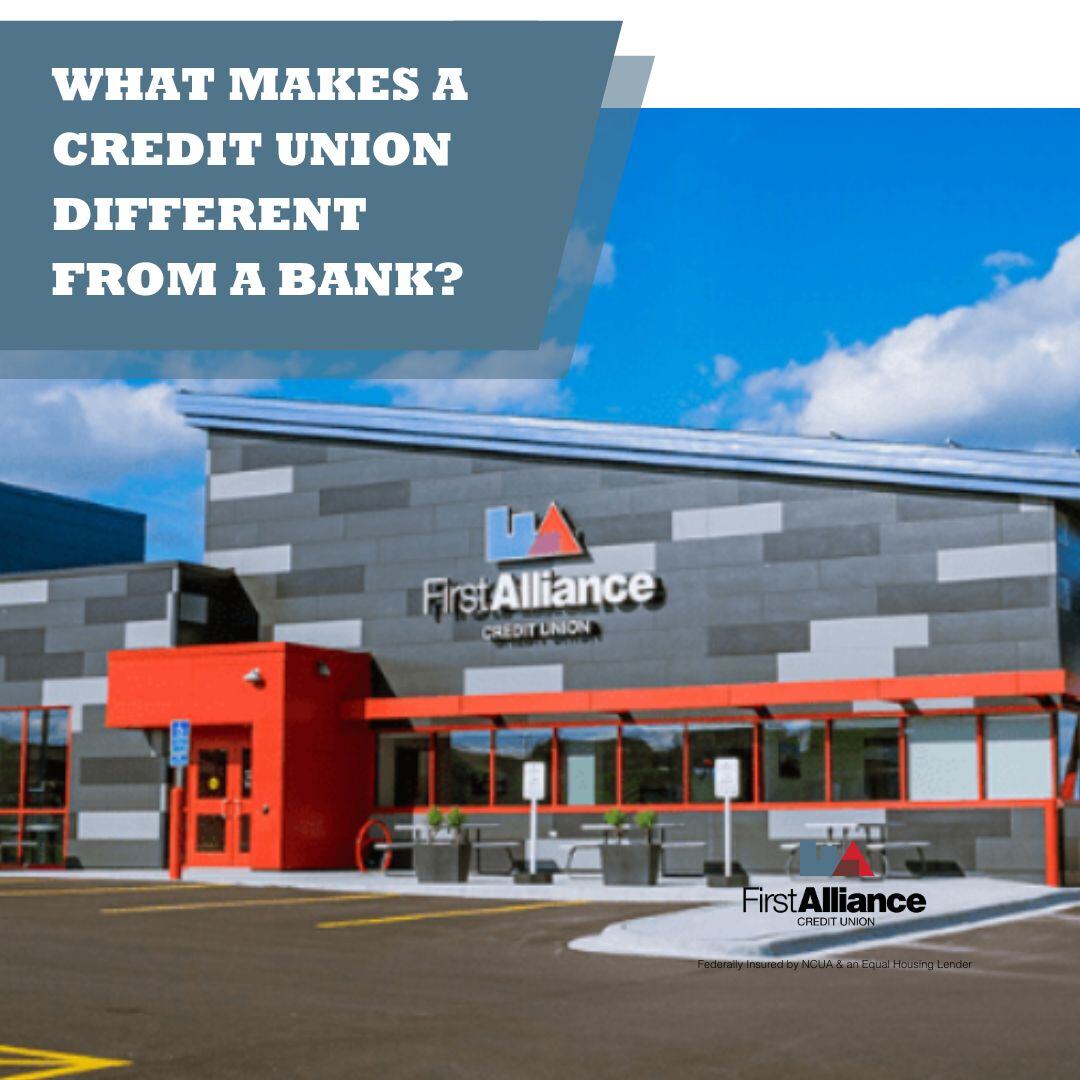What Makes a Credit Union Different From a Bank?
Bank vs Credit Union…what’s the difference? On the surface banks and credit unions can seem very similar. Both banks and credit unions offer...
8 min read
 Jenna Taubel
:
May 14, 2024 5:15:00 AM
Jenna Taubel
:
May 14, 2024 5:15:00 AM

In the world of personal finance, the choice between a credit union and a bank can be a pivotal decision. But what exactly sets these two institutions apart, and why might one be a better fit for your financial needs than the other? Let's dive in and explore the ins and outs of credit unions versus banks.
Are you pondering whether a credit union might suit your financial needs better than a traditional bank? It's a question many people find themselves asking as they seek the best financial institution to entrust with their money. Let's dive into the differences between banks and credit unions to help you make an informed decision.
In today's financial landscape, choosing where to open a banking account can be a confusing decision. Each type of institution offers its own set of services and perks, but understanding the roots of credit unions can shed light on why they may be a preferable choice for you. Let's first, delve into a quick history of credit unions and why they exist.
The story of credit unions traces back to the early 20th century when blue collar workers faced financial exclusion from traditional banks. During the 1920s and 1930s, the working class found it challenging to secure loans or even open savings accounts due to stringent requirements set by banks. Recognizing this disparity, pioneers like Alphonse Desjardins in Canada and Edward Filene in the United States championed the establishment of credit unions.
These grassroots movements aimed to democratize finance by creating cooperative financial institutions owned and operated by their members. Credit unions were born out of the idea of "people helping people," where individuals pooled their resources to provide affordable loans and banking services to their communities. These core values of mutual assistance and community support became the cornerstone of the credit union movement.
Alphonse Desjardins, often referred to as the "Father of the Credit Union Movement," played a pivotal role in founding the first credit unions in Canada. His vision of providing financial services to the underserved laid the foundation for the cooperative banking model that continues to thrive today.
In the United States, Edward Filene, a prominent businessman and social reformer, advocated for consumer rights and economic justice. He recognized the potential of credit unions to empower individuals and communities economically. Through his efforts, credit unions gained recognition and support, paving the way for their widespread adoption.
Dora Maxwell was a trailblazing credit union pioneer from New York state. Despite facing challenges from intimidating bankers, she successfully secured charters for hundreds of credit unions across the United States.
Louise Herring is celebrated for her pivotal role in establishing five hundred credit unions and advocating for the dual share insurance system. She was instrumental in founding the Credit Union National Association (CUNA) and is affectionately known as the "Mother of Credit Unions" within the U.S. credit union movement for her tireless efforts since its inception.
At the heart of credit unions lies the principle of "people helping people." Unlike banks, which prioritize profits for shareholders, credit unions operate as not-for-profit cooperatives owned by their members. This fundamental difference allows credit unions to focus on serving the best interests of their members rather than maximizing profits.
Credit unions offer a range of financial products and services, including savings accounts, loans, and credit cards, often with lower fees and competitive interest rates. Members also have a voice in the decision-making process, as they elect representatives to serve on the credit union's board of directors.
By fostering a sense of community and shared responsibility, credit unions empower individuals to achieve their financial goals while promoting economic resilience and inclusivity.
Both banks and credit unions offer similar products and services, but the underlying philosophies and structures differ significantly. Below you will find five factors that separate banks and credit unions.
Both banks and credit unions provide peace of mind by offering federal insurance on deposits. Banks are insured by the Federal Deposit Insurance Corporation (FDIC), while credit unions are insured by the National Credit Union Administration (NCUA). This means your money is protected up to certain limits in case of institutional failure, similar to how the FDIC insures deposits at national banks. Additionally, credit unions have seen an increase in total assets, showing their financial stability and ability to protect members' deposits.
One of the most significant distinctions between banks and credit unions lies in their business structures. Credit unions operate as not-for-profit financial cooperatives, meaning they exist to serve their members rather than generate profits for shareholders. Banks, on the other hand, are for-profit entities driven by the goal of maximizing shareholder returns. This is the main difference between credit unions and banks, as it affects their operations, goals, and overall approach to serving their customers.
When you join a credit union, you become a member-owner rather than just a customer. This distinction is crucial because it means you have a say in how the credit union operates. Credit union members, as part owners, can vote to elect board members to represent them and help make crucial decisions about the strategic direction of the institution. In contrast, banks answer to their stockholders, who may not necessarily be customers of the bank.
At a credit union, you're not just a number; you're a valued member of a community. Credit unions often prioritize personalized service and building relationships with their members. This can result in a more tailored approach to meeting your financial needs, with staff who know you by name and understand your unique circumstances. In contrast, banks may focus more on transactions or growing profits and less on fostering a sense of belonging.
Credit unions often have membership criteria based on a common bond, such as living in a particular community, working for a specific employer, or belonging to a particular organization. This shared connection creates a sense of unity among members and strengthens the cooperative spirit. Additionally, credit unions can be chartered at the state or federal level, each with its own set of regulations and oversight.
In the world of banking, there's often a debate about whether credit unions or banks offer the better financial experience. While both have their merits, there's a lot to be said for the unique advantages that credit unions bring to the table, especially when it comes to choosing the right bank account. If you're considering where to park your money, let's delve into why opening an account at a credit union might just be the right move for you.
One of the standout benefits of credit unions is their tendency to offer lower interest rates on loans compared to traditional banks. This is because credit unions are not-for-profit organizations owned by their members, which means they can prioritize providing affordable financial services rather than maximizing profits. Whether you're in the market for a car loan, mortgage, or personal loan, credit unions often offer competitive rates that can save you money in the long run. Additionally, credit unions are known for their exceptional customer service, making the loan process a more pleasant and personalized experience for their members, regardless of their credit score.
Similarly, credit unions often offer higher interest rates on savings accounts and certificates of deposit (CDs) compared to banks. Again, this is due to their member-focused ethos, which allows them to return earnings to their members in the form of better interest rates, known as APY. By parking your savings in a credit union account, you can watch your money grow at a faster pace than with a traditional bank.
Tired of being nickel-and-dimed by your bank with various fees? Credit unions typically have fewer fees and lower account maintenance charges than banks. Many credit unions even offer accounts with no monthly maintenance fees or minimum balance requirements, allowing you to keep more of your hard-earned money in your pocket.
Unlike big banks that operate on a national or even international scale, credit unions are often deeply rooted in their local communities. This means decisions about lending, investments, and community initiatives are made by people who understand the unique needs and challenges of the community. If you value personalized service and a community-focused approach to banking, a credit union might be the perfect fit for you.
Worried about paying hefty fees every time you need to withdraw cash from an ATM? Many credit unions belong to nationwide ATM networks that allow their members to access cash without incurring additional fees. This means you can enjoy the convenience of withdrawing cash from thousands of ATMs across the country without worrying about racking up fees.
Perhaps the most compelling reason to choose a credit union over a bank is their unwavering commitment to their members and the communities they serve. As member-owned cooperatives, credit unions exist to serve the financial needs of their members rather than shareholders. This means they're often more invested in building relationships, offering personalized service, and supporting local initiatives that benefit the community as a whole.
In the realm of personal finance, the choice between a credit union and a bank can sometimes feel like a daunting decision. However, navigating through the myriad of misconceptions surrounding credit unions can make this decision seem even more challenging. Fear not, next we are debunking some of the most common myths about credit unions and shedding light on why they might be the best option for you.
Truth 1: There is a credit union for everyone.
One of the most prevalent myths about credit unions is that they have restrictive membership criteria, making it difficult for individuals to join. Contrary to popular belief, credit unions often have a diverse range of membership eligibility requirements. While some credit unions may have specific affiliations or geographic restrictions, many are open to anyone within a certain community or profession. Whether you're a teacher, healthcare worker, or resident of a particular area, there's likely a credit union that you can join if you meet their membership requirements.
Truth: You can access your money anywhere, anytime with a credit union.
Another common misconception is that credit unions lack the convenience and accessibility of traditional banks. In reality, most credit unions offer a wide array of digital banking services, including online banking, mobile banking, apps, and ATMs. Additionally, many credit unions participate in shared branching networks, allowing members to conduct transactions at thousands of locations nationwide. So whether you're across town or across the country, accessing your money with a credit union is as easy as ever.
Truth: Credit unions are modern financial institutions.
Some people may believe that credit unions are outdated or too small to provide the comprehensive financial services they need. However, this couldn't be further from the truth. Many credit unions are well-equipped with modern technology and offer a full range of banking products and services, including checking accounts, savings accounts, loans, credit cards, business services, small business loans, and more. Additionally, credit unions are member-owned, meaning they prioritize the needs and interests of their members above all else.
Truth: Credit unions offer better rates and exceptional service for all.
Contrary to popular belief, credit unions serve a wide range of members, including individuals from all income levels and financial backgrounds. In fact, one of the key advantages of credit unions is their commitment to offering competitive rates and personalized service to all members. Whether you're looking to save money on loans, earn higher interest on your savings, or receive personalized financial guidance, credit unions are dedicated to helping you achieve your financial goals.
In conclusion, credit unions offer a viable alternative to traditional banks, with numerous benefits and advantages for consumers. While both credit unions and banks have their place in the financial landscape, credit unions offer a unique set of benefits that can make them a better choice for many individuals and families. It's true that banks and credit unions offer similar products and services, but the underlying philosophies and structures differ significantly. Additionally, it is important to consider the cons of traditional banks, such as higher fees and less personalized service, when deciding between the two options.
So, when it comes to the age-old question of whether a credit union is better than a bank, the answer largely depends on your personal preferences and financial goals. But with their member-focused approach, competitive rates, and commitment to community, credit unions certainly offer a compelling alternative to traditional banking institutions. So why not consider joining a credit union today and experience the difference for yourself?

Bank vs Credit Union…what’s the difference? On the surface banks and credit unions can seem very similar. Both banks and credit unions offer...

When choosing where to stash your cash, you really only have two options: a bank or a credit union. However, most people don’t seem to actually know...

Credit unions and banks may, at first glance, seem to be quite similar. Both types of financial institutions let you open checking and savings...